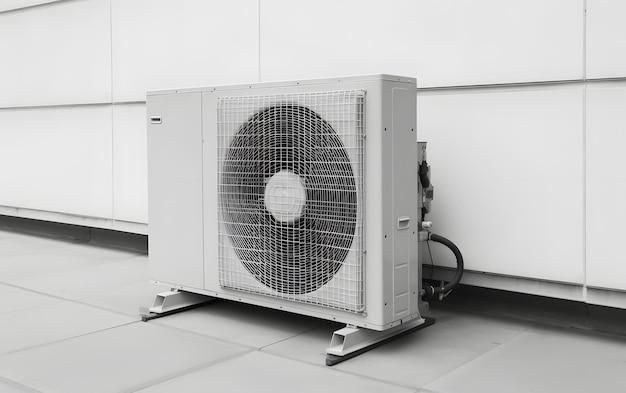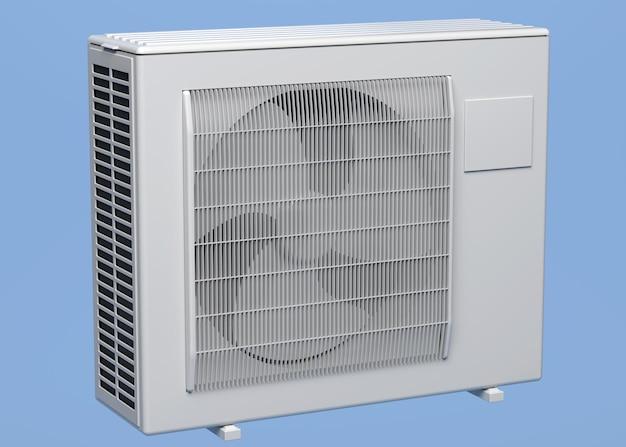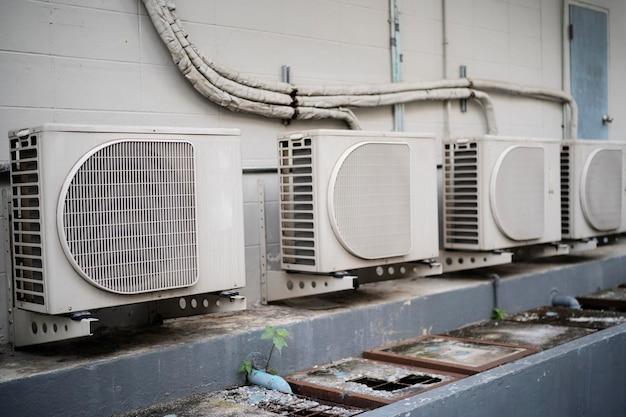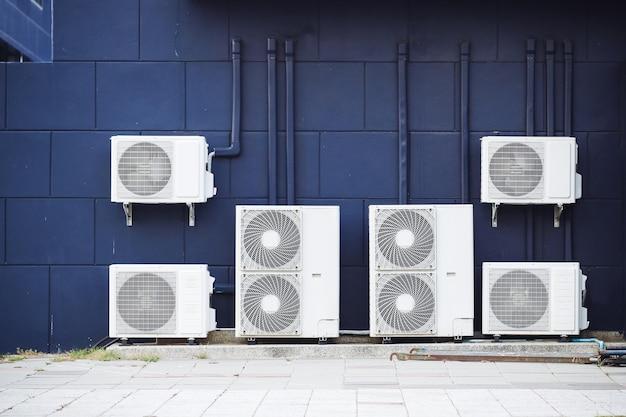Are you tired of your traditional air conditioning system costing you a fortune in energy bills? Have you considered a water-cooled AC system? A water-cooled central air conditioner offers a more eco-friendly and cost-effective solution to your cooling needs. But do they really work? And how does a water-cooled condenser differ from an air-cooled one? In this comprehensive blog post, we explore the ins and outs of water-cooled air conditioners, including its advantages and potential drawbacks. Read on to learn more.
AC with Water-Cooled Condenser: A Cool Upgrade!
Air conditioning systems have been around for a long time. They’ve become essential in the modern world because of the ever-increasing temperature. But have you ever wondered about the science behind air conditioners? The intricate details of how the condenser works, for example?
In this section, we’ll look closely into water-cooled condensers that come with air conditioners. Think of it like wearing a cooling vest in extreme heat!
Water-Cooled Condenser? What’s That
A water-cooled condenser is a component that helps regulate the temperature of an air conditioning system. It uses water to cool the hot refrigerant gas, which helps transform it back into a liquid state. Sounds simple, right?
Well, here’s where it gets interesting. Most air conditioning systems use air-cooled condensers, which can get pretty loud and bulky. Water-cooled condensers, on the other hand, are more compact, quiet, and efficient.
Benefits of Water-Cooled Condensers
Water-cooled condensers come with a ton of amazing benefits, such as:
- Quiet Operation: Water-cooled condensers are much quieter than air-cooled ones. You won’t even hear them unless you’re listening extra carefully.
- Efficient Cooling: Since water is a better heat conductor than air, water-cooled condensers are much more efficient, which translates to lower electricity bills.
- Long-Lasting: Water-cooled condensers have a longer lifespan than air-cooled ones. Since they are more efficient and require less maintenance, they tend to last longer.
- Space-Saving: Water-cooled condensers are much smaller than air-cooled ones. You can save a ton of space by using them in your air conditioning system.
How Do Water-Cooled Condensers Work
Water-cooled condensers might look intricate, but they work on a simple principle. Their main purpose is to remove heat from the refrigerant gas.
Here’s a quick rundown of how they work:
- First, the refrigerant gas, which has absorbed heat from an indoor space, enters the water-cooled condenser.
- Second, the water-cooled condenser’s job is to cool the hot refrigerant gas. It does this by pumping water over a series of pipes that contain the gas. The water absorbs the heat from the refrigerant, which helps convert it back into a liquid state.
- Lastly, the liquid refrigerant is pumped back inside the air conditioner’s compressor, where it goes through a series of other processes.
Water-cooled condensers offer a ton of amazing benefits over traditional air-cooled ones. They are quiet, efficient, long-lasting, and space-saving. Not to mention, they can be a conversation starter at your next party!
Overall, if you’re considering an upgrade to your air conditioning system, you should definitely take a look at water-cooled condensers. They offer a superior cooling experience that’s hard to match.
Water-Cooled AC Systems: Keep Your Cool with Water
Are you tired of your traditional air conditioning system not keeping up with the heat? It might be time to consider a water-cooled AC system. These systems use water instead of air to cool down the refrigerant, resulting in a more efficient and effective cooling process.
How do water-cooled AC systems work
Water-cooled AC systems work by running water through a condenser, which is located outside, to cool down the refrigerant that runs through the evaporator inside your home. The refrigerant absorbs the heat from your home and carries it outside to dissipate it, resulting in cooler air being blown back into your home.
Benefits of a water-cooled AC system
One of the biggest advantages of a water-cooled AC system is its energy efficiency. These systems can save you up to 30% on your energy bills compared to traditional AC systems, making them a more environmentally friendly and cost-effective option.
In addition, water-cooled AC systems are also quieter than traditional systems since they don’t rely on loud fans to circulate air. They are also more durable and can last longer since they don’t have to work as hard to cool down your home.
Installation and maintenance
While water-cooled AC systems require professional installation, they are relatively easy to maintain. Since they don’t rely on air filters, you don’t have to worry about cleaning or replacing them. However, it’s important to regularly check the water levels and inspect the system for leaks.
If you’re looking for a more energy-efficient and cost-effective way to cool down your home, a water-cooled AC system might be the right choice for you. With its durability, quiet operation, and easy maintenance, it’s a smart investment for any homeowner. So, keep your cool with water and consider a water-cooled AC system for your home today!
Water-Cooled Central Air Conditioner: How it Works
Have you ever wondered how those massive central air conditioning units cool down large industrial spaces? Well, wonder no more! Allow me to demystify the science behind water-cooled central air conditioners, in a way that even a non-engineer like myself can understand.
The Basics
A water-cooled central air conditioner works by using water as a heat-transfer medium instead of air. The unit first absorbs the heat from the indoor air and then transfers it to a water-cooled condenser. The condenser then transfers the heat to water, which circulates through a cooling tower for disposal.
The Advantages
The main advantage of water-cooled central air conditioners is that they’re more efficient than their air-cooled counterparts. This efficiency is due to the fact that water is more effective at absorbing heat than air, meaning that the unit can cool down the air faster and at a lower cost.
Another advantage of these units is that they’re quieter than air-cooled units since they don’t need a large fan to circulate air. As a result, they’re often used in noise-sensitive environments such as hospitals.
The Drawbacks
The main drawback of water-cooled central air conditioners is that they require a significant amount of water to operate. The average unit can consume up to 100 gallons of water per minute! This means that they need to be connected to a reliable water source, such as a municipal water supply or a well.
In addition, water-cooled units can be more expensive to install and maintain than air-cooled units. They require additional equipment such as a cooling tower and a water treatment system.
Despite their drawbacks, water-cooled central air conditioners are a viable option for cooling large spaces efficiently and quietly. As water conservation becomes a more critical issue, it’s essential to weigh the pros and cons before deciding on which type of central air conditioner is best for you.
Do Water Cooled Air Conditioners Work
If you’re using an air conditioner this summer and you’re wondering how it works, you might want to check out this section for some answers. We’ll discuss the functionality of a water-cooled air conditioner, how it differs from an air-cooled air conditioner, and whether it works.
How Does Water-Cooled AC Work
A water-cooled air conditioner works by circulating water through the condenser coil instead of air. The principle is the same as a traditional AC unit: refrigerant is compressed and cooled so that it can absorb heat from the space it is cooling. However, instead of a fan blowing over the condenser coil to dissipate the heat, water is used in a closed-loop system to cool down the refrigerant.
How Does It Differ from Air-Cooled AC
In an air-cooled air conditioner, the hot refrigerant is pumped outside and passed over a set of metal fins, which dissipate the heat into the air. In contrast, a water-cooled air conditioner uses water as a heat transfer medium and pumps it through a tower to be cooled. The cooled water is then circulated through the condenser coil, replacing the air in an air-cooled system. Water-cooled AC systems are generally more efficient than air-cooled systems because water has a higher heat capacity and can absorb more heat than air.
Does It Work
Yes, water-cooled air conditioners work and can be very effective cooling systems for larger commercial or industrial spaces. They have several advantages over air-cooled systems, including improved efficiency, lower ambient noise levels, and flexible installations. However, water-cooled air conditioners do have higher maintenance costs and can pose water leakage problems if not installed and maintained correctly.
To sum it up, water-cooled air conditioners are a viable and efficient option for cooling larger spaces. But before investing in one, you should evaluate your cooling needs and options carefully to ensure that this type of system is the best solution for your needs.
How a Water Cooled Condenser Works
So, you’re wondering how a water-cooled condenser works? It’s quite simple, really. A water-cooled condenser is a type of heat exchanger that uses water for cooling purposes. It is commonly used in air conditioning systems, refrigeration systems, and even in power plants.
The Science Behind Water Cooled Condensers
The concept behind this technology is based on the fundamental principle that heat flows from a hotter object to a cooler one. When the hot refrigerant gas from the compressor enters the water-cooled condenser, it comes into contact with the cool water running through the tubes, which absorbs the heat. As a result, the refrigerant gas begins to lose heat and condenses back into liquid form.
The Cooling Process
Once the gas has been condensed, the liquid refrigerant is then passed through an expansion valve, which reduces its pressure and temperature. This cooled and low-pressure liquid refrigerant is then circulated back into the evaporator coil in the air conditioning system, where it absorbs heat from the surrounding air, and the cycle begins anew.
The Advantages of Water Cooled Condensers
Water-cooled condensers have several advantages over their air-cooled counterparts. They are much more efficient and reliable than air-cooled condensers, as water is a better conductor of heat than air. Additionally, they are much less noisy and produce less vibration. Water-cooled condensers are also more compact and can be installed in areas where space is limited.
In conclusion, water-cooled condensers are an important component of many HVAC and refrigeration systems. They play a vital role in maintaining the proper temperature of a space. By circulating water through a series of tubes, they are able to efficiently absorb and dissipate heat, keeping the refrigerant at the appropriate temperature. So, the next time you turn on your air conditioning, remember the magic that’s happening behind the scenes with a water-cooled condenser.
Difference between Air Cooled and Water Cooled Condenser
If you’re trying to figure out the best way to keep your AC running efficiently, you might be wondering whether an air-cooled or water-cooled condenser is best. Both systems have their benefits and drawbacks, so let’s break down the differences between them.
Air Cooled Condenser
An air-cooled condenser works by taking hot refrigerant gas and circulating it through a bundle of tubes exposed to the outside air. The air then removes the heat from the refrigerant, which returns it to a liquid state. This system can be relatively simple to install and maintain, and it doesn’t require a source of water to function.
On the downside, air-cooled condensers require a lot of space, as they need to be located somewhere with good air flow. They also tend to be noisier than water-cooled alternatives, and they can be less efficient in areas with hot, humid climates.
Water Cooled Condenser
Water-cooled condensers operate by running water over a bundle of tubes with the refrigerant inside. The water absorbs heat from the refrigerant, which is then pumped away and cooled in a separate section of the building or outside.
Water-cooled systems are typically more efficient than air-cooled ones, especially in areas with hot and humid climate. They can also be quieter and take up less space than air-cooled alternatives.
However, water-cooled systems are also more complex and expensive to install and maintain as they require a source of water, either from a cooling tower or a well. These systems also need regular monitoring to ensure that they don’t develop leaks.
Ultimately, the choice between an air-cooled and water-cooled condenser will depend on your specific needs and circumstances. If you need maximum efficiency and have access to a reliable water source, a water-cooled condenser may be your best bet. On the other hand, if you’re working with limited space and want a simpler setup, an air-cooled condenser could be the way to go.
Whichever you choose, remember to keep up with regular maintenance and inspections to ensure that your AC runs smoothly all year round.
Problems associated with Water Cooled Condenser
Are you considering installing a water cooled condenser for your AC unit? Well, there are a few things you should know before making that decision. We’re not trying to scare you, but there are some problems you might encounter with water cooled condensers that you should be aware of. Don’t worry, we’re here to give you the scoop!
Risk of Legionella
One of the most significant risks of using a water cooled condenser is the potential growth of Legionella bacteria in the system. This is a type of bacteria that can cause Legionnaires’ disease, a severe type of pneumonia that can be deadly. The bacteria thrive in warm, damp environments and can contaminate the water that circulates inside the condenser. However, this risk can be minimized with proper maintenance and cleaning procedures.
Maintenance and Cleaning
Speaking of maintenance and cleaning, that’s another problem associated with water cooled condensers. These systems require regular cleaning and maintenance to prevent the buildup of dirt, debris, and bacteria. Neglecting these tasks can lead to decreased efficiency, more frequent breakdowns, and even health hazards.
Water Supply
Another thing to consider is the availability and quality of the water supply in your area. Water cooled condensers require a steady supply of clean, potable water to function correctly. If the water quality in your area is poor, then you might end up with clogged pipes, buildup of mineral deposits, and other issues that can be costly to fix.
Increased Costs
Finally, you should keep in mind that water cooled condensers are generally more expensive to install and maintain than air-cooled systems. Not only do they require more frequent cleaning and maintenance, but they also use more water, which can be costly if you’re on a metered supply.
In conclusion, while water cooled condensers offer several advantages over air-cooled systems, they do come with their fair share of problems too. Before making a decision, it’s essential to weigh the pros and cons carefully and consider all the factors involved. If you decide to go for a water cooled condenser, make sure you choose a reputable supplier and installer, and follow the proper maintenance and cleaning procedures to minimize the risks and ensure optimal performance.



